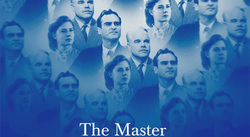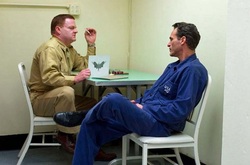
Starring: Joaquin Phoenix, Phillip Seymour Hoffman and Amy Adams
Review Written By: Michael Dalton
The film focuses on Freddie Quell (Joaquin Phoenix) a disturbed World War Two veteran who becomes a drunken and dangerous drifter. One night he stumbles across a party on a boat and meets, the master, otherwise known as Lancaster Dodd (Phillip Seymour Hoffman) the leader of a movement known as, The Cause. Freddie becomes his right-hand man and soon finds himself violently defending the words of his master. However, is Freddie truly dedicated to the cause? And can the words and more importantly the leader of this movement be trusted?
This is a film that I am nervous to review, as I know that I could easily write twice as much in a detailed analysis of the film after a second and even third viewing. This is a dense film that is novelistic in regards to its symbolism, themes and central conflict. However to compare its depth to that of a book is not meant in any way to imply that it lacks a visual presence. On the contrary, The Master is a beautiful film and one that I am glad I saw on the big screen. Much was made of Paul Thomas Anderson’s decision to shoot this film on 70mm, whatever he and his cinematographer have done, this film has a hypnotizing and entrancing aesthetic, one that simultaneously harmonizes and haunts. Shots from this film could be taken as singular images and hung on a wall. With a filmmaker as meticulous and thoughtful as Paul Thomas Anderson, every shot in this film appears to have a purpose and to be saying something. Visually, this film is representative of a master at work.
However Anderson’s imagery is accompanied and augmented by Johnny Greenwood’s original score. Their second collaboration after 2007’s There Will Be Blood, Anderson and Greenwood are threatening to become the next great director/composer duo. Greenwood’s score, like the film it is a part of, is unconventional, different, it interests, moves and disturbs you. It is made out of familiar sounds yet is like nothing you’ve heard before; it gets in your head and stays there. Musical scores tend to have ambitions to either stand out and drive forth the action, or subliminally accompany it; Greenwood’s score does both. It is intrusive yet also suitable. It is a score that is literally ringing in my ears as I type this review and one that will have a life outside of the film it’s a part of. Just like describing why certain aspects of this film are brilliant, or people describing why they believe certain things they believe, Greenwood’s score escapes rational and conventional explanation. There is something about it, something deep within its construction that has got into my head and stuck with me.
What will undoubtedly stay long in the minds of all who see this film are the performances. If it weren’t for a certain Daniel Day-Lewis, I believe the Oscars would have no choice but to award Joaquin Phoenix for what I consider the best leading actor performance of 2012. Phoenix is a force of nature in this film, an explosive animal who constantly has you fearing and feeling for him. Many have compared this performance to vintage Brando and the comparison is apt. Watching this film you forget at times you are watching actors, Phoenix is so believable and worlds away from his other characters or real-life personality. Freddie Quell as a character is incredibly fascinating, in part due to Anderson’s screenplay and in part due to the phenomenal performance of Phoenix. This will be the performance that Phoenix is remembered for and that will be cited as his best work and if it isn’t, then we’ve got one hell of a performance to look forward to. Phillip Seymour Hoffman is brilliant as ever as the titular, master. His character is charming, charismatic yet creepy and cunning in equal measure. While Phoenix and Freddie have violent and psychical outbursts, Hoffman’s and Dodd’s outburst are of a briefer, more psychically controlled and verbal nature. The scenes the two actors share together demonstrate some of the best acting you will see all year and of any year. The scene where Hoffman’s Dodd submits Phoenix’s Freddie to some ‘informal processing’ is one of the best-written and acted scenes I have ever seen. It is intense, raw, honest, emotional, gripping and contains what is perhaps cinema’s best fart joke. Yes, you read that right. Who said that this film was pretentious? Amy Adams also deserves recognition as Dodd’s wife, the arguably true master of the film. Underneath her cute and controlled exterior lies a drive and control that is only briefly yet memorably displayed.
The Master is a film that is driven by characters and their actions rather than a conventional plot. The film moves at a slow pace and feels longer than it is. While I was never bored, by the time it reached its conclusion, I was ready for it to end and I do feel that it could have been shorter, particularly towards the latter half, where it appeared to reach a couple of endings before reaching its actual finale. Much of my enjoyment however rested in an appreciation and awestruck wonder in the filmmaking craft, the images, the music, the dialogue and the acting. If you’re not somebody who takes appreciation in the way in which a film is made and needs a thrilling, emotionally clear, story, then you may find The Master a tough sit. This film is very much its own Rorschach test; you see what you want to see and what your psyche shows you. I have read many different interpretations of what this film’s conclusion and what the film overall meant. In my eyes the most significant line of dialogue is spoken by Dodd to Freddie near the film’s conclusion
“If you can find a way to live your life without serving a master, any master, then let the rest of us know, will you? For you’d be the first person in the history of the world“
The Master is a film that doesn’t mock or take a clear stance against the views presented by Dodd, there is even a fair suggestion that for some, such views and such practices may be a necessary comfort and can help them become better people. The film ends on a hopeful or cynical note, depending on how you want to read it, yet for me, like life and like this film, I see it as a little bit of both. This is a film about the inner struggle between man’s psychical and psychological nature, about the need and desire for human connection, about misunderstood madness, post-war America, belief, dependence and independence. It has thought-provoking themes, an engrossing central relationship between two actors at the peak of their powers, provided with dialogue and direction from a master who may also be at the peak of his. Many have already labeled this an American masterpiece, an instant classic and a film akin to the work of Stanley Kubrick. I fully believe that due to the dense nature of its story and the phenomenal work of its actors, that this is a film that will be remembered, watched and discussed many years from now. I don’t love it yet and I need a second viewing to determine where I stand on certain plot points and see whether the film’s pacing and length remains bothersome, however also just to revel in a fine filmmaking achievement.

Rating: 8+/10
By Movie Parliament Prime Minister,
Michael Dalton
 RSS Feed
RSS Feed
